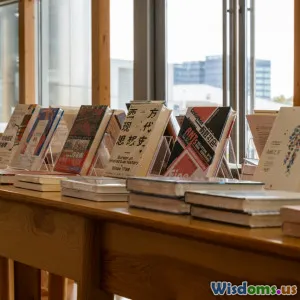
Ten Indian Writers You Need to Read for a Global Perspective
8 min read Explore ten Indian writers whose works offer invaluable insights into global perspectives and diverse cultural narratives. (0 Reviews)
Ten Indian Writers You Need to Read for a Global Perspective
India, a land of diverse cultures, languages, and history, has produced a myriad of literary talents whose works reach far beyond its borders. These writers capture not only the essence of Indian life but also universal experiences and ideas, offering readers rich, nuanced perspectives on humanity, society, and politics globally. Exploring their writings opens doors to new ways of thinking and understanding the world through the kaleidoscope of Indian experience.
Why Read Indian Writers for Global Perspectives?
Indian writers often traverse themes such as colonialism, identity, spirituality, gender, and migration, reflecting age-old traditions alongside modern realities. Their narratives resonate worldwide, contributing to global discourses about post-colonialism, diaspora, and cultural hybridity. Reading Indian authors enriches the reader's appreciation of global interconnectedness and diverse human stories.
1. Arundhati Roy
Arundhati Roy burst onto the literary scene with her Booker Prize-winning novel The God of Small Things (1997). This powerful work explores caste, family, and forbidden love in Kerala with prose both lyrical and poignant. Beyond fiction, Roy is a vocal activist whose essays on globalization, environmental issues, and human rights have sparked worldwide debates.
Her blend of storytelling and activism showcases how literature can be both a mirror and a mold for society.
2. Salman Rushdie
Salman Rushdie's works, including Midnight’s Children (1981), which won the Booker Prize, meld magical realism with historical narratives. His storytelling articulates post-colonial India’s fractured identity and the complexity of multiculturalism.
Rushdie's vivid portrayal of India's political upheavals provides a layered understanding of modern history through fiction, making him a vital read for grasping India's global-cultural identities.
3. Jhumpa Lahiri
Though writing primarily in English and based in the U.S., Jhumpa Lahiri explores the Indian diaspora experience with a global scope. Her Pulitzer Prize-winning collection Interpreter of Maladies (1999) reveals intimate immigrant stories bridging two worlds with empathy and nuance.
Lahiri’s themes of displacement, identity crises, and cultural connections resonate universally in an era of global migration.
4. R.K. Narayan
A pioneer in bringing Indian stories to the English-speaking world, R.K. Narayan’s fictional town of Malgudi brought everyday Indian life to the global reader. His simple yet profound storytelling in classics like Swami and Friends captures the charm and challenges of colonial and post-colonial India.
Narayan's work exemplifies how local stories can be universally appealing without losing cultural specificity.
5. Kamala Das
Kamala Das, an icon of Indian English poetry and prose, gave voice to female desire, identity, and social expectations in a traditionally conservative society. Her candid autobiographical work, My Story (1976), is renowned for breaking taboos and boldly exploring gender and sexuality.
Her writings contribute to global feminist discourses by challenging social norms with honesty and fiery expression.
6. Vikram Seth
Vikram Seth’s monumental work A Suitable Boy (1993) is one of the longest novels published in English and vividly maps post-independence Indian society. It incorporates various social strata, religions, and cultures, highlighting India’s pluralism and political turbulence.
Seth’s versatility across genres — from poetry to travelogue — enriches his global appeal.
7. Anita Desai
Anita Desai densely populates her novels with introspective characters confronting personal and cultural upheavals. In Clear Light of Day (1980), she probes the tensions between modernity and tradition amid political shifts.
Desai’s evocative prose and psychological insight probe the human condition within Indian and broader contexts.
8. Ruskin Bond
Known for his gentle, evocative stories of life in the Indian Himalayas, Ruskin Bond’s works like The Blue Umbrella traverse themes of simplicity, kindness, and nature.
His accessible narratives offer readers worldwide a nostalgic and heartfelt glimpse into Indian small-town life and environmental beauty.
9. Kamila Shamsie
While primarily based in Pakistan, Kamila Shamsie represents a South Asian voice with immense crossover appeal. Often included in broader Indian literary discourse, her works, such as Home Fire (2017), confront identity, politics, and extremism, resonating globally.
Her narratives offer parallels in post-colonial South Asia’s struggles, enriching the reader's understanding of the region’s interconnectedness.
10. Kiran Desai
The Booker Prize-winning novel The Inheritance of Loss (2006) by Kiran Desai blends personal histories with the socio-political changes in India and the Indian diaspora in the West. The novel dissects themes like globalization, poverty, and identity crises with acerbic humor and empathy.
Desai’s work uncovers how colonial legacies continue shaping global cultural dialogues.
Conclusion: Embracing Indian Literary Voices
Engaging with these ten Indian writers extends far beyond enjoying rich storytelling — it encourages readers to explore complex cultural interactions, histories, and identities that shape not only India but the global community. Their voices challenge, inform, and inspire us to look beyond borders, making them essential readings for anyone seeking a deeper global perspective.
As you delve into their works, you'll discover how Indian narratives illuminate shared human experiences, reminding us that literature is a bridge to empathy and understanding in an ever-globalizing world.
References and Further Reading:
- Rohit Chopra, "The Global Impact of Indian Literature", Journal of South Asian Studies, 2019.
- Interview excerpts with Arundhati Roy and Salman Rushdie on literary activism and post-colonial identity.
- Booker Prize official site archives.
- Lahiri’s Pulitzer Prize acceptance speech.
Embark on this literary journey to enrich your worldview and connect more deeply with global voices through the lens of India’s finest authors.
Rate the Post
User Reviews
Popular Posts

















